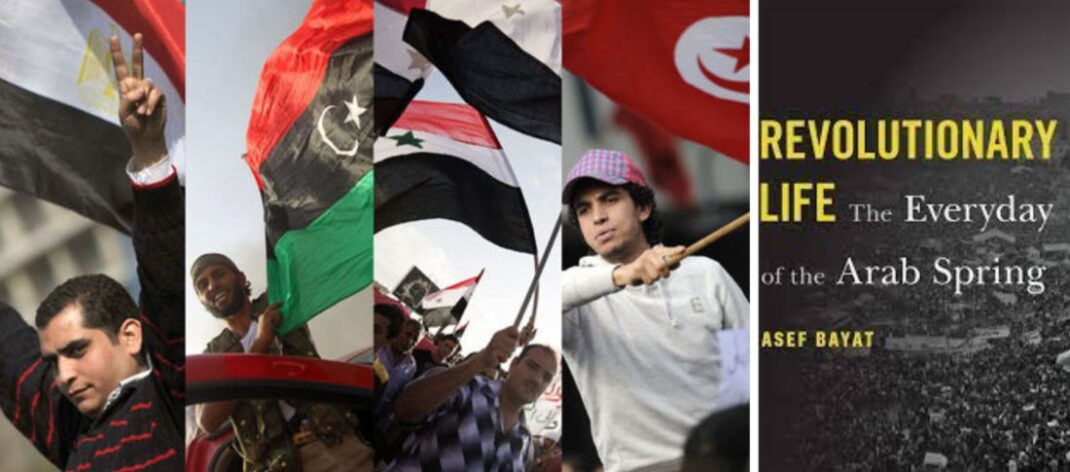Massaoud Romdhani

From the perspective of an ordinary observer, the 2011 Arab Spring, which was sparked in Tunisia and spread like wildfire to Egypt and other Arab countries, has been a bitter failure. Even Tunisia’s fragile democracy, once the only apparent bright spot in the entire landscape, has now reached a similar failed fate after President Kais Saied seized full power, shuttering down the parliament, freezing institutions, and ruling by decree.
Yet for Asef Bayat, Professor of Sociology and an authority on social movements in the Arab region, the outcome of the uprisings has not been all doom and gloom. In his new book, Revolutionary Life: The Everyday of the Arab Spring, focused on both Tunisia and Egypt, Bayat asserts that even if the Arab Spring failed to dismantle dictatorships and establish democracy and social justice, it nonetheless made a huge breakthrough in the ‘bottom society,’ affecting the subaltern’s everyday lives and practices. Notably, it has given an amplified voice to marginalised groups that played a vital role in the uprisings, including women, youth, and the poor, empowering them to take steps forward toward claiming their full rights.
Compared to his other well-known book written on the eve of the 2011 uprisings, Life as Politics: How Ordinary People Change the Middle East, Revolutionary Life is a new perception of the forms of resistance taken by the subaltern or marginalised populations in Arab Spring countries. In his earlier book, Bayat’s view of resistance posits that citizens become involved in social ‘nonmovements’ , which are disorganised movements initiated by ordinary people who have no predominant ideology or leading organisation. From such movements, people peacefully and passively resist authoritarian regimes, and consequently, such ‘popular politics’ do not lead to major societal transformations or ‘radical’ revolutions. In Revolutionary Life, however, Bayat’s perspective has shifted; he argues that there is a strong relationship, even complementarity, between everyday life and revolutions.
Indeed, whatever we may say about the outcomes of the Arab Spring and its failure to democratise societies in the region, a fundamental change has occurred in social life: the revolutionary experience has entrenched a new culture of resistance among citizens that, sooner or later, will force repressive regimes to concede. According to Bayat, individuals representing different segments of society, especially among the subaltern or marginalised classes, undergo major affective changes during the extraordinary revolutionary moments of uprisings. They curb their selfishness; no longer thinking in terms of ‘me’ or ‘my community’ but in terms of we, Tunisians or Egyptians.
Consequently, personal interests recede to give way to common ideals such as freedom, justice and democracy for all citizens. This does not mean, however, that particular claims of different groups (gender equality for women, jobs for young unemployed people, social justice for the poor, integration of sexual minorities) are forgotten. It simply means that people realise that the revolutionary moment is unique for the entirety of the nation and therefore it requires a new sense of solidarity.
Take women for instance, who suffer from prejudice and violence in the patriarchal and misogynist societies that are common to the Arab region and globally. Their presence side by side with men during the weeks of uprising in both Egypt and Tunisia was conspicuous. Yet during the entirety of the process, women were so preoccupied with broader citizenry action that they put off their urgent gender claims. The revolutionary momentum required postponing conflicts and unifying forces when facing repressive regimes.
After the uprisings, women faced new challenges. In both countries, ungrateful patriarchal societies forgot about women’s important contributions and they had to face a cascade of setbacks caused by the revival of a deep-rooted and latent social conservatism. In Egypt for instance, women were victimised by violence from conservative clerics and by sexual violence from both the military and police. In Tunisia, even though women did not experience the same level of violence as those in Egypt, they were nonetheless threatened with the loss of the rights they had gained over decades.
Regardless of the regressions in women’s rights and freedoms following the uprisings, new challenges were faced by empowered women who learned how to fight back from the revolutionary experience they underwent. In other words, a new type of woman has been born: vocal, entitled, and resilient. Even feminism underwent a transformation, no longer is it elitist and urban-based.
The new ‘bottom-up feminism’ impacted rural women and victims of family and economic violence through small financial projects and independent associations. Even in the private realm, women began to challenge social conventions. For instance, a large movement of ‘deveiling’ took place in both Tunisia and Egypt, defying traditions as many women took off their hijab. It was not so much a question of denying religion; it is more a question of a new idea of religiosity, born in the revolutionary atmosphere. In short, ‘Women had empowered not only the uprisings but also their own affective selves,’[3] wrote Asef Bayat.
We can observe a similar overall phenomenon in regards to the youth of the Arab region. Nobody can deny the substantial contribution of young people during the uprisings, giving a peculiar flavour, ‘a youthful taste’ to the revolutionary events with rap songs, innovative slogans, graffiti, calligraphy, poetry and a new efficient approach to social media while going beyond their urgent youth-focused claims in favour of their country’s more broadly based concerns. However, as in the case of women, their contributions have not been rewarded.
New political elites have only reproduced the old patriarchal rules, inciting both anger and despair among young people. But these young people remain far from giving up. Unable to impact the mentality of the rulers, they have instead resorted to street politics as a means of changing the country’s course.
Once Ben Ali and Mubarak were ousted and the new patronising elites monopolised state politics, the youth turned to their specific claims: students demanded educational reforms, Ultras football fans challenged the police and military in stadiums and streets, young people in disadvantaged areas and interior regions fought for jobs and rural youth struggled for agrarian reforms and land redistribution.
While Egypt saw an explosion of youthful political groups, Tunisia saw an unprecedented increase in social movements demanding employment, regional equity, and a healthy environment. Also in Tunisia, where a sequence of independent elections has taken place over the past decade, and despite resentment in integrating political parties, youth associations were present in monitoring the elections and overseeing the work of the parliament.
Here, it is worth recalling that if previous generations in the 1970s and 1980s were steeped in ideology (Marxism, Pan Arabism, or later Islamism), these youths pursue their protest movements and street politics with no ideological compass, relying on their own experience and new, original ways of mobilisation. That is partly why their movements are based on horizontality with a total absence of charismatic leadership.
Challenging established ideas, perceptions and hierarchies in the post-revolutionary era was not limited to women and youth. Gay rights groups also emerged, taking advantage of new atmosphere. Even though they were met with disdain and repression from both the Islamists and the military in Egypt, in Tunisia they made a massive leap forward.
Although Tunisia’s penal code still contains an article (230) that punishes homosexuality with up to three years imprisonment, gay Tunisians and their allies have become vocal and gained substantial space: a queer magazine was published online, and the LGBTQ organisation ‘Shams’ received an authorisation from the Ministry of Interior in 2016. Other LGBTQ organisations, like ‘Damj’ and ‘Mawjoudin’ became part of the Tunisian NGO landscape.
Doesn’t this seem unimaginable in Muslim countries? Well, the revolution itself was an extraordinary moment; a rupture with past normality and past ideas, traditions, prejudices and perceptions.
And this rupture with established social, cultural and religious views is going to leave its mark. It is true that revolutionary moments are often short-lived and cause despair and disenchantment when the outcomes do not meet early hopes and expectations. However, the revolutionary fermentation incubates empowerment among subaltern groups as the destruction of the ‘wall of fear’, established by repressive regimes, gives way to innovative resistance and, in the long run, potentially a different future.
Most analyses focus on elite political changes after the revolutionary moment: the new elites, political leaders, democratic advances and institutions. Although Bayat does not dispute the importance of such factors, he believes that there are two notable aspects of the revolutionary moment that deserve much attention. The first is the significant contribution of ordinary people to the uprisings: women, marginalised youths, the poor, and social minorities; and secondly, that the substantial rights gained by these ordinary people during their resistance will not be easily withdrawn.
Thus, when he identifies the subaltern’s contributions and their potential social gains from the uprisings in Tunisia and Egypt, Bayat gives us a deeper and more optimistic view of the Arab Spring, despite its deceptions and disappointments.
However, one question still looms: Needn’t this social resistance be conveyed through a clear political expression in order to live on and challenge the unpopular policies of repressive regimes? Many people are pessimistic about the future of non-political resistance.
Young people ‘might continue rallies but they couldn’t craft coalitions…so they could not influence politics. You can build pressure in the street but eventually if that pressure cannot find the pathway into a political system then you’re going to be marginalized,’ commented Hichem El Alaoui on the legacy of the Arab Spring. This point of view, I think, is worth meditating on while appreciating all subaltern social contesting.
_____________





